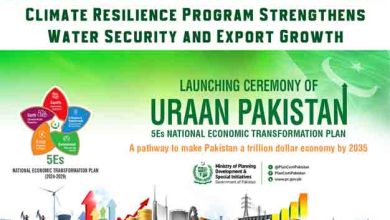Alarming Heat Surge: Warmer-Than-Normal February Signals Growing Climate Stress in Pakistan
Warmer-than-normal February in Pakistan brings rising temperatures, uneven rainfall, water stress, and climate risks across regions, warns PMD outlook.
Warmer-than-normal February in Pakistan is set to reshape weather patterns across the country, according to the Pakistan Meteorological Department’s (PMD) February 2026 climate outlook. The forecast highlights rising temperatures nationwide, limited rainfall in southern regions, and comparatively wetter conditions in the north — a pattern increasingly linked to climate change.
Experts warn that prolonged heat combined with uneven precipitation could deepen Pakistan’s water stress, affect crop productivity, and increase climate vulnerability, particularly in already fragile regions.
PMD’s February 2026 Climate Outlook: What to Expect
The Pakistan Meteorological Department projects:
- Above-normal temperatures across all provinces
- Near-normal but subdued rainfall in southern Pakistan
- Wetter-than-normal conditions in northern regions
- No major extreme rainfall events — but localized risks
Climate drivers such as ENSO shifting toward neutral and a neutral Indian Ocean Dipole are influencing this evolving weather pattern.
External Source: Pakistan Meteorological Department Climate Outlook (https://www.pmd.gov.pk)
Southern Pakistan Faces Rising Heat and Moisture Stress
In Sindh, southern Punjab, and southeastern Balochistan, rainfall is expected to remain limited while temperatures continue rising.
This combination may:
- Increase soil moisture loss
- Worsen water shortages
- Stress agricultural systems
- Intensify drought vulnerability
Farmers in these regions already struggle with declining groundwater levels — a trend worsened by hotter winters and shorter rainy seasons.
Limited rainfall could also aggravate:
- Urban smog and air pollution
- Public health risks
- Heat exposure in vulnerable communities
Northern Pakistan to See Wetter Conditions — With Hazards
While southern Pakistan dries, Khyber Pakhtunkhwa, Gilgit-Baltistan, Kashmir, and northern Punjab are expected to receive above-normal rainfall.
Benefits may include:
- Improved water availability
- Support for rain-fed Rabi crops
- Temporary relief from drought
Climate Drivers Behind the Shift
ENSO (El Niño–Southern Oscillation)
PMD reports ENSO moving from marginally negative to neutral, often linked with uneven rainfall distribution across South Asia.
Indian Ocean Dipole (IOD)
Remaining neutral, the IOD supports slightly above-normal precipitation in northern Pakistan.
External Source: NOAA ENSO Monitoring (https://www.climate.gov)
What This Means for Pakistan’s Agriculture
Warmer-than-normal February in Pakistan could have mixed agricultural impacts:
Benefits:
- Improved growth of Rabi crops in northern regions
- Better soil moisture in rain-fed zones
Risks:
- Crop stress in southern farmlands
- Higher irrigation demand
- Increased farming costs
- Lower yields if heat intensifies
With agriculture employing nearly 40% of Pakistan’s workforce, climate instability directly threatens food security and rural livelihoods.
Air Quality and Public Health Concerns
Warmer, drier weather in southern plains may worsen:
- Smog accumulation
- Respiratory illnesses
- Heat exhaustion risks
While fog is expected in parts of Punjab and northern Sindh, disrupting:
Road traffic
Air travel
Though vector-borne disease risk remains low during winter, rising temperatures could extend mosquito seasons earlier than usual.
Climate Change Is Redefining Pakistan’s Seasons
Climate scientists increasingly note that:
- Winters are getting shorter
- Heatwaves are arriving earlier
- Rainfall is becoming unpredictable
Pakistan is among the top 10 climate-vulnerable countries globally, despite contributing less than 1% to global emissions.
Rising temperatures during traditionally cooler months signal long-term climate disruption rather than temporary anomalies.
External Source: UN Climate Risk Index (https://www.germanwatch.org)
Water Security at Growing Risk
The February outlook reinforces a worrying reality:
Southern Pakistan continues sliding deeper into water stress while northern regions face climate volatility.
Impacts include:
- Declining groundwater tables
- Greater dependence on glacial melt
- Increased conflict over water resources
- Pressure on irrigation systems
This connects directly to Pakistan’s broader water crisis and Indus Basin vulnerability.
Internal Link Example:
Explore Pakistan’s water crisis trends → your Karachi water shortage article
Why This Forecast Is a Climate Warning
While no extreme rainfall events are predicted, the pattern of rising heat and uneven precipitation mirrors long-term climate projections for South Asia.
Key takeaways:
Hotter winters becoming normal
Shifting monsoon reliability
Growing drought-flood cycles
Rising economic losses
The warmer-than-normal February in Pakistan is not just a seasonal update — it’s a climate signal.
Conclusion: A New Climate Reality Is Taking Hold
Pakistan’s February 2026 forecast underscores a hard truth: climate change is already altering the country’s weather rhythm.
From rising heat stress in the south to flood risks in the north, Pakistan is facing a dual climate burden that threatens:
Food security
Water resources
Public health
Economic stability
As warmer winters become the norm, policymakers must accelerate:
- Climate-resilient agriculture
- Water conservation strategies
- Heat adaptation planning
- Early warning systems
The climate crisis is no longer seasonal — it is structural.







